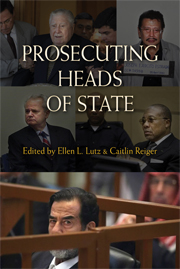Book contents
- Frontmatter
- Contents
- List of Contributors
- About the International Center for Transitional Justice
- Foreword
- Preface
- 1 Introduction
- 2 Prosecutions of Heads of State in Europe
- 3 Prosecutions of Heads of State in Latin America
- 4 The Multiple Prosecutions of Augusto Pinochet
- 5 A Leader Takes Flight: The Indictment of Alberto Fujimori
- 6 Charm and Punishment: How the Philippines' Leading Man Became Its Most Famous Prisoner
- 7 Shifting Legitimacy: The Trials of Frederick Chiluba
- 8 A Justice “Trickle-Down”: Rwanda's First Postgenocide President on Trial
- 9 Justice Squandered? The Trial of Slobodan Milošević
- 10 A Big Man in a Small Cell: Charles Taylor and the Special Court for Sierra Leone
- 11 Political Pedagogy, Baghdad Style: The Dujail Trial of Saddam Hussein
- 12 Conclusion
- APPENDIX: List of Prosecutions of Heads of State or Government since 1990
- Selected Bibliography
- Index
7 - Shifting Legitimacy: The Trials of Frederick Chiluba
Published online by Cambridge University Press: 06 August 2009
- Frontmatter
- Contents
- List of Contributors
- About the International Center for Transitional Justice
- Foreword
- Preface
- 1 Introduction
- 2 Prosecutions of Heads of State in Europe
- 3 Prosecutions of Heads of State in Latin America
- 4 The Multiple Prosecutions of Augusto Pinochet
- 5 A Leader Takes Flight: The Indictment of Alberto Fujimori
- 6 Charm and Punishment: How the Philippines' Leading Man Became Its Most Famous Prisoner
- 7 Shifting Legitimacy: The Trials of Frederick Chiluba
- 8 A Justice “Trickle-Down”: Rwanda's First Postgenocide President on Trial
- 9 Justice Squandered? The Trial of Slobodan Milošević
- 10 A Big Man in a Small Cell: Charles Taylor and the Special Court for Sierra Leone
- 11 Political Pedagogy, Baghdad Style: The Dujail Trial of Saddam Hussein
- 12 Conclusion
- APPENDIX: List of Prosecutions of Heads of State or Government since 1990
- Selected Bibliography
- Index
Summary
The Principal Resident Magistrate Court in Zambia's capital, Lusaka, is an unimpressive building. A tinned roof caps a dusty set of rooms, fake-mahogany panels peel off the walls, and discarded brooms lay hunched in an unruly pile. Smoke from mounds of burning grass outside infiltrates the courtroom, filling it with a woody haze. And everything, from the gate to the witness box to the judge's chair, creaks. Yet this humble setting forms the backdrop to a continent-wide precedent in judicial accountability. On a morning in early May 2005, Zambia's former president, Frederick Chiluba, arrived at court in an ad hoc motorcade of white Toyota pickup trucks. As usual, he was adorned in a dazzlingly sharp suit, as if audaciously exhibiting the evidence of his infamous shopping trips to Geneva. Chiluba took his seat wedged next to a window latticed with iron bars – the first African former head of state ever to be tried for serious crimes in a free and fair domestic court process.
This chapter concerns the numerous trials of Frederick Chiluba on charges of large-scale corruption under ordinary criminal law and gives an analytical focus to the changing levels of international involvement in the process. In doing so, the chapter distinguishes between two phases in Chiluba's trials. The first (Phase I) involves the events leading up to the removal of Chiluba's presidential immunity and his eventual arrest, which were the outcome of a Zambian political movement free from outside assistance.
- Type
- Chapter
- Information
- Prosecuting Heads of State , pp. 130 - 150Publisher: Cambridge University PressPrint publication year: 2009

